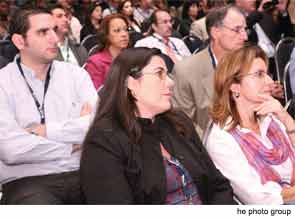
Explore This Issue
October 2012WASHINGTON—Conducting research based in your own medical practice can be a fulfilling pursuit, yielding findings that are much more practical and applicable to the real world than other kinds of research, said otolaryngologists with CHEER, a practice-based research network, during a panel here at the 2012 Annual Meeting of the American Academy of Otolaryngology-Head and Neck Surgery, held Sept. 9–12.
CHEER, which stands for Creating Healthcare Excellence through Education and Research, is designed to help doctors busy with daily clinical practice get research projects off the ground, acting as an information source and, in some cases, a source of funding. The group comprised 12 academic sites and 12 private practice sites throughout the country, totaling 200 otolaryngologists, 100 audiologists and 50 speech language pathologists.
The idea behind the program is to generate new, meaningful research that might not otherwise have happened, the network’s staff says. “‘Practice-based’ means that we are going to focus on questions and priorities that are important to the daily practitioner,” said David Witsell, MD, the principal investigator with CHEER and director of the Duke Voice Care Center in Durham, N.C. “That’s where most of medicine is practiced. Most of otolaryngology is out in the community and, to do real practice-based research, we need to involve the practitioners and understand their priorities, questions and problems.”
He said the network sets out to work on projects with “sufficient diversity such that you can generalize the results, [that] the results are important [and] impactful, and that they’re generalizable across a wider proportion of our health care community.” He likened practice-based research to Silly Putty, saying, “We can really begin to model that in ways that are very different from the typical clinical research model that we have learned in the past.”
Very little research—only about 14 percent, Dr. Whitsell said—ever gets incorporated into actual practice, and the research that does waits 17 years for that to happen. This lag shows that there must be some kind of gap. “Does the new information translate?” he said. “Is it communicated? Are there conversations going on between the investigators, the clinical scientists and the community?”

A Variety of Projects
Studies underway include an AAO-HNSF-funded study exploring awareness of and barriers to the implementation of the recently published AAO-HNSF sudden hearing loss guidelines. In another effort, the National Institute on Deafness and Other Communication Disorders is funding a study on the use of voice therapy and the perceptions and barriers that exist from the perspective of both patients and providers.
Leave a Reply